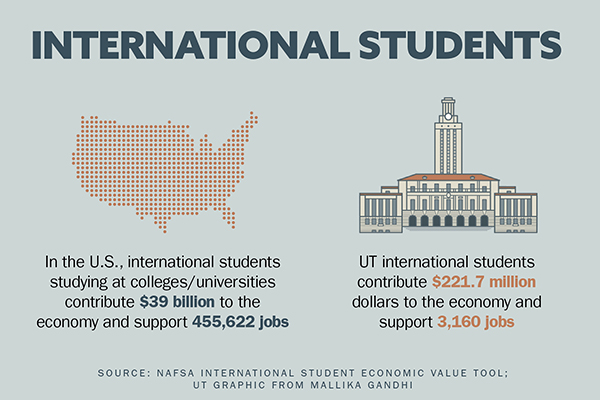During the 2017–18 academic school year, UT international students contributed $221.7 million to the U.S. economy, which helped support 3,160 jobs, according to the NAFSA: International Student Economic Value Tool.
NAFSA is a nonprofit association of international educators. Rachel Banks, NAFSA public policy director, said there are three avenues through which international students have contributed greatly to the economy.
“International students typically pay higher, out-of-state tuition rates to attend college. They are also not eligible for financial aid,” Banks said in an email. “International students also contribute to innovation. Nearly one-quarter of the founders of $1 billion U.S. startup companies first came to America as international students.”
According to the International Office, UT has 6,043 international students. International students from China are the largest group within UT’s total international population with 1,504 students.
Keyun Li, a psychology and rhetoric and writing senior from Beijing, said it is common knowledge in China that studying in the United States costs a lot. In-state students can pay up to $5,926 per semester in undergraduate tuition, while Li said she pays more than $19,000 per semester.
“To study in the States, it’s expensive in general,” Li said. “People will apply for scholarships, for sure, because nobody wants to pay huge amounts of money if they can pay less. But for my family, it’s acceptable. It’s in the plan, but it may be a burden for some families.”
Undergraduate international students are not likely to receive any funding from UT, partially because they are not eligible for federal aid, said Margaret Luévano, interim director of International Student and Scholar Services.
Despite the economic contribution of international students that support U.S. jobs, international students are only allowed on-campus jobs, unless they get permission to work off-campus in a job related to their studies.
“Those international students who come to UT on student visas have limitations on what they’re allowed to do and one of them is to work off campus,” Luévano said.
Luévano said the financial benefit is just one of the assets international students bring to campus.
“The inherent value of having international students and scholars at UT is to be able to … make sure that we’re bringing the brightest minds to UT, but also (to cultivate) a global viewpoint that will help not only have international students understand Texas and the United States, but for us to understand the world better,” Luévano said.





















